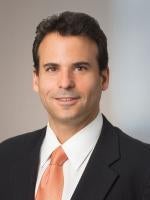Premier League Takes the Pitch in Fight against Pirated Streams
The United Kingdom's most popular soccer league is using skillful legal tackling to maintain possession of its intellectual property. The Football Association Premier League Limited (the "Premier League") obtained an injunction order from the High Court of Justice in England, Chancery Division, on March 13, 2017, that will enable it to block illegal streams delivering live internet feeds of Premier League games to viewers via Internet Protocol television ("IPTV") boxes or similar streaming devices in real time. Authority for such an order is found in Section 97A of the Copyright, Designs and Patents Act 1988, which empowers the High Court "to grant an injunction against a service provider, where that service provider has actual knowledge of another person using their service to infringe copyright."
The order requires the defendants — British Telecommunications PLC ("BT"), EE Limited, Plusnet PLC, Sky UK Limited ("Sky"), TalkTalk Telecom Limited ("TalkTalk"), and Virgin Media Limited ("Virgin") — to each take measures to block, or at least impede, their customers' access to infringing streams by targeting streaming servers. It should be noted that during the course of the proceeding, the defendants supported the Premier League's application and were involved in negotiations over the terms of the order.
This order is unprecedented for the league and the defendants — who are the six primary retail internet service providers ("ISPs") in the UK — because of how it counteracts advances in internet piracy technology. Unlike earlier website-blocking orders, which suspended access to specific websites that hosted illegal streams of games (or notified server operators and hosts, who may not have promptly or effectively complied with the requests), this order seeks to cut off streams at their sources by blocking IP addresses of the suspected domestic or overseas servers at the ISP level while the games are being played. If access to the originating server is blocked, all other mobile access mechanisms will be disrupted. Thus, with the versatility of a talented striker, the Premier League is able to eradicate infringing feeds from websites, apps, set-top boxes, and other devices running media players and other software with third-party add-ons. A significant portion of such streams could be affected and infringers will be caught offside.
The order comes on the heels of a well-timed bicycle kick against such illegal streamers of Premier League games. In another recent ruling, several facilitators of illegal streams to pubs and suppliers of pre-loaded IPTV boxes were hit with a series of fines totaling £360,000. Neosat, a Dubai-based company selling digital satellite equipment, was hit hardest with an order to pay a total of £100,000 and cease the sale of illegal IPTV devices. Rulings such as this indicate the Premier League's diligence in combating copyright infringement.
The Premier League's increased focus on preventing piracy coincides with significant investments from Sky and BT into the rights to broadcast Premier League games. Sky agreed in August 2016 to pay £4.2 billion for a three-year agreement granting rights to show live Premier League matches. BT Sport recently secured exclusive rights until 2021 to broadcast Champions League games for £1.18 billion, and presently has the rights to broadcast 42 Premier League matches this season. Both telecommunications companies have an interest in the kind of anti-piracy measures the Premier League sought in this case to protect their rights and ensure customers view games from legitimate sources. Indeed, according to the court, BT, Sky and Virgin — the United Kingdom's three largest ISPs by subscriber size — all filed evidence in support of the Premier League's application. TalkTalk, the UK's fourth largest ISP, confirmed in writing to the court that it also does not oppose the application.
How will the ISPs institute such blocking? While specific evidence has been kept confidential by the High Court, the justice noted that there are measurable spikes in traffic during Premier League games purportedly linked to illegal streaming. In addition, the court noted that the Premier League could accurately identify streams in real time and can immediately notify the ISPs, which could use their own automated systems to block and unblock IP addresses at the relevant times. To ensure the administration of justice in initiating blocks on streams, the order provides for a series of safeguards, such as resetting the lists of targeted servers each match week during the Premier League season and notifying affected website hosting providers. In addition to other constraints, before reporting IP addresses to the ISPs for blocking, the Premier League must "reasonably believe" the targeted servers have the "sole or predominant purpose of enabling or facilitating access to infringing streams of Premier League match footage" and not have reason to believe the servers are "being used for any other substantial purpose."
It remains to be seen how effective the order will be in deterring piracy and how accurately it can be implemented. For this reason, the High Court limited the duration of the order to the end of the current Premier League season, with the expectation that it could be renewed if the efforts prove successful. Regardless, the message being sent by the Premier League is clear: unlike a perfectly placed free kick, no one scores by bending the law.
Celebrity Trainer Sweats Fitness Studio over Alleged Knockoff Exercise Machine
Bay Area residents looking to get their usual Pilates fix may soon be in search of a new routine. At least, that's the hope of famed fitness guru and celebrity trainer, Sebastien Lagree. The strength savant and founder of Lagree Fitness flexed his legal lats by filing an intellectual property suit last month against the owners and operators of BodyRok studios, claiming that his competitors (and former licensees) are unlawfully using "Lagree Method" machinery and techniques at the expense of Lagree's public image and reputation.
In his bulky 52-page complaint, Lagree (along with Lagree Technologies and Lagree Fitness) accuses BodyRok and its founders of copyright, trademark and patent infringement, as well as unfairly trading on Lagree's name and celebrity without authorization. (Lagree Technologies, Inc. v. Spartacus 20th L.P., No. 17-00795 (N.D. Cal. filed Feb. 17, 2017)). The core argument in Lagree's complaint is that BodyRok's success after termination of its licenses to use the Lagree Method is "wholly derived" from its alleged (1) unauthorized copying of Lagree Method specifications for the BodyRok manual to teach classes and certify instructors, (2) unauthorized use of Lagree's trademarks to identify exercises, and (3) infringing development and use of its BodyRok machine.
For years, Pilates has served as a popular physical fitness workout for everyone from hardcore exercise junkies to those just looking to burn off a few extra calories. Founded by Lagree in 2001, Lagree Fitness looked to raise the bar by incorporating elements such as strength training and cardio into an intense, low impact Pilates-style routine, which he named the "Lagree Method" (and some others have termed "souped-up Pilates"). To help power his exercise method, Lagree created a specially designed Pilates machine – the "Megaformer" – which he then patented (e.g., U.S. Patent No. 8,641,585 for "an exercise machine having a rolling platform and adjustable bar members"). In addition, Lagree obtained federal trademark registrations for a number of the exercises in the Lagree Method, including such buff‑sounding marks as ELEVATOR LUNGE and CATFISH, and in the complaint asserts common law trademark rights in exercise terms such as THE MERMAID CRUNCH and BUNGEE KICKS.
According to the complaint, the first authorized licensee of the Lagree Method opened its studio in 2006, and the number of licensed fitness studios quickly expanded over the years. As a result, Lagree developed a certification program, encapsulated in an extensive copyrighted training manual, to ensure his method was practiced to his exact specifications by Lagree fitness trainers and Lagree licensees' fitness trainers. In 2011, Lagree first entered into license agreements with principals of BodyRok to open Lagree studios in several California locations. Lagree alleges that BodyRok's founders later terminated licenses to certain planned gyms in 2014 and decided to open a competing studio and develop their own exercise machine. Lagree eventually cancelled his remaining licenses with BodyRok studios in 2016. However, BodyRok quickly recovered by allegedly swapping out Megaformer machines with its own BodyRok machines, which Lagree claims are infringing knockoffs, and by issuing its own BodyRok manual, which the complaint states "recites the 'specification' for each Lagree Method exercise from the Lagree Manual verbatim, including all of the Lagree Trademarks."
Lagree further contends that BodyRok's infringement has cramped his company's business through BodyRok's continued association with the Lagree Method. Included in his complaint is an alleged snippet that formerly appeared on BodyRok's website, which touted Lagree as the originator of one of BodyRok's exercise classes. Lagree concludes that this unauthorized promotion has deceived the public into believing that BodyRok studios are sponsored or authorized by Lagree.
In all, the complaint presses for monetary damages and injunctive relief preventing BodyRok from continuing its allegedly infringing practices.
Having not yet responded to the complaint, BodyRok and the other defendants filed a motion for an extension of time to iron out their reply to Lagree's complaint. The defendants argued that the complaint, with its triple threat of IP claims, is rife with complex allegations that require additional time for which to craft an answer. In his response, Lagree noted that the two-week extension of time that Lagree originally offered to the defendants was sufficient given the circumstances. In its order, the court ordered the defendants to respond to the complaint by April 7, 2017. In subsequent proceedings, however, the plaintiff signaled his intention to file an amended complaint, to which the defendants will file a timely answer.
As the dispute is still in its early stages, it remains to be seen whether Lagree's infringement claims will carry their weight in court or if BodyRok will successfully turn up the juridical resistance in reply.
Online Gambling Operator Returns Serve against Italian Sportswear Company in "Lotto" Domain Names Dispute
In a match between the top seeded Italian sportswear maker Lotto Sport Italia and the unranked online gambling operator David Dent, the first set went to the Italian conglomerate, based upon its well-spun arguments about two disputed "lotto" themed domain names that won the day at a WIPO proceeding. In February 2017, in a domain name arbitration pursuant to the Uniform Domain Name Dispute Resolution Policy (UDRP), the panelist ordered that Dent's domains,
Lotto Sport was founded in 1973 in Montebelluna, Italy, with an initial focus on tennis shoes, but it later branched out into shoes, apparel and game jerseys for soccer, basketball and volleyball. Over the next several decades, the business scored sponsorship deals with international tennis and Italian soccer players, transforming the company into a worldwide sportswear, footwear and custom uniform powerhouse with a presence in over 110 countries. Beyond apparel and footwear, Lotto Sport also hosts soccer tournaments and sponsors well-known soccer and tennis players, as well as European and national soccer clubs. On the IP front, it holds multiple trademarks, including international and EU trademark registrations related to the mark LOTTO WORKS and various international trademark registrations for the LOTTO mark (see e.g., U.S. registration, No. 4148339, for clothing, retail services, leather goods).
The plaintiff David Dent is a Canadian individual whose Gibraltar-based business Trimark, Ltd. is involved with the development and licensing of online and mobile lottery, bingo and casino games in jurisdictions where such gaming is permitted.
Under paragraph 4(a) of the UDRP, the Complainant is required to prove the following three elements: (1) the disputed domain names are identical or confusingly similar to the Complainant's trademark; and (2) the Respondent has no rights or legitimate interests in respect of the disputed domain names; and (3) the disputed domain names have been registered and are being used by the Respondent in bad faith. In its UDRP proceeding, Lotto Sport alleged that the disputed domains,
In response, Dent volleyed that he purchased the domain names from a third party for several thousand dollars each without knowledge of Lotto Sport's marks and for the purpose of establishing online lotto-themed games, stressing that under U.S. law, Lotto Sport should not be able to gain enforceable rights in marks containing the word "lotto" in relation to gaming services because "lotto" is merely a generic term for "lottery" in the English language.
In its order, the panelist found that Lotto Sport had prevailed on the three necessary elements and ordered the transfer of the domains – in essence, ruling that Dent had registered the disputed domain names to trade off the goodwill of Lotto Sport's marks and long-standing renown. (Lotto Sport Italia S.p.A. v. Dent, WIPO Case No. D2016-2532 (Feb. 13, 2017)).
Among other things, the panelist found that Dent had booted the rollout of his online games by failing to launch any active websites, leading the panel to conclude that: "Respondent has not made demonstrable preparations to use the Disputed Domain Names for a bona fide offering of goods or services." Furthermore, Dent's legal footwork failed to dissuade the panel from ruling that it could not have been "mere coincidence that the Disputed Domain Name
Under the UDRP, the losing party has ten business days following the panel's decision to file a lawsuit against the Complainant in a jurisdiction where the Complainant has submitted under the UDRP rules and procedures, thereby staying the transfer until the resolution of the action. Refusing to retire after its initial setback, Dent came to the net and filed an action in Arizona district court against Lotto Sport, seeking an order that its domain name registrations were lawful and an award of attorney's fees and statutory damages under the Anticybersquatting Consumer Protection Act (ACPA). In his return salvo, Dent advanced a claim under the ACPA that Lotto Sport unlawfully caused the domains to be locked and has otherwise engaged in reverse domain name hijacking, which is the use of the UDRP "in bad faith to attempt to deprive a registered domain-name holder of a domain name." Dent's complaint states, among other things, that he had purchased the domain names only weeks before Lotto Sport's UDRP complaint was filed, and had not been given enough time to deploy the sites for legitimate gaming purposes before the complaint was filed. The complaint also asserted that Dent had reasonably believed that his registration and use of the domain names was lawful under the Lanham Act, particularly since his domain name registrations were not likely to cause consumer confusion because Dent's use for lotto games would not suggest any affiliation with Lotto Sport's sportswear and apparel business. Lotto Sport has not yet filed its answer in this action.
In a legal battle that that seemed as if it might be resolved in straight sets, this hard-court battle appears far from over, giving onlookers something to watch in the time before the summer Grand Slam season begins in earnest.








 />i
/>i

